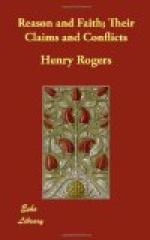But, alas! the phenomena are still intractable. The stubborn ‘Book’ will still baffle all such efforts to explain it away; it is willing to be rejected, if it so pleases men, but it guards itself from being thus made a fool of. For who can fail to see that neither all or any considerable part of the multifarious miracles of the New Testament can be explained by any such gratuitous extension of ingenious fancies; and that if they could be so explained, it would be still impossible to exculpate the men who need such explanations from the charge of perpetuating the grossest frauds! Yet this logical ostrich, who am digest all these stones, presumptuously declares a miracle an impossibility and the very notion of it a contradiction.* But enough of Mr. Foxton.
____
* Mr. Foxton denies that men, in Paley’s ’single case in which he tries the general theorem,’ would believe the miracle; but he finds it convenient to leave out the most significant circumstances on which Paley makes the validity of the testimony to depend, instead of stating them fairly in Paley’s own words. Yet that the sceptics (if such there could be) must be the merest fraction of the species, Mr. Foxton himself immediately proceeds to prove by showing what is undeniably the case) that almost all mankind readily receive miraculous occurrences on far lower evidence than Paley’s common sense would require them to demand. Surely he must be related to the Irishman who placed his ladder against the bough he was cutting off. I
____
There are no doubt some minds amongst us, whose power we admit, and whose perversion of power we lament, who have bewildered themselves by really deep meditation on inexplicable mysteries; who demand certainty where certainty is not given to man, or demand for truths which are established by sufficient evidence, other evidence than those truths will admit. We can even painfully sympathise in that ordeal of doubt which such powerful minds are peculiarly exposed—with their Titanic struggles against the still mightier power of Him who has said to the turbulent intellect of man, as well as to the stormy ocean ’Hitherto shalt thou come, but no farther,—and here shall thy proud waves be staid.’ We cannot wish better to any such agitated mind than that it may listen to those potent and majestic words: ‘Peace—be still!’ uttered by the voice of Him who so suddenly hushed the billows of the Galilean lake.
But we are at the same time fully convinced that in our day there are thousands of youths who are falling into the same errors and perils from sheer vanity and affectation; who admire most what they least understand, and adopt all the obscurities and paradoxes they stumble upon, as a cheap path to a reputation for profundity; who awkwardly imitate the manner and retail the phrases of the writers they study; and, as usual, exaggerate to caricature their least agreeable eccentricities. We should think that some of these more powerful minds




